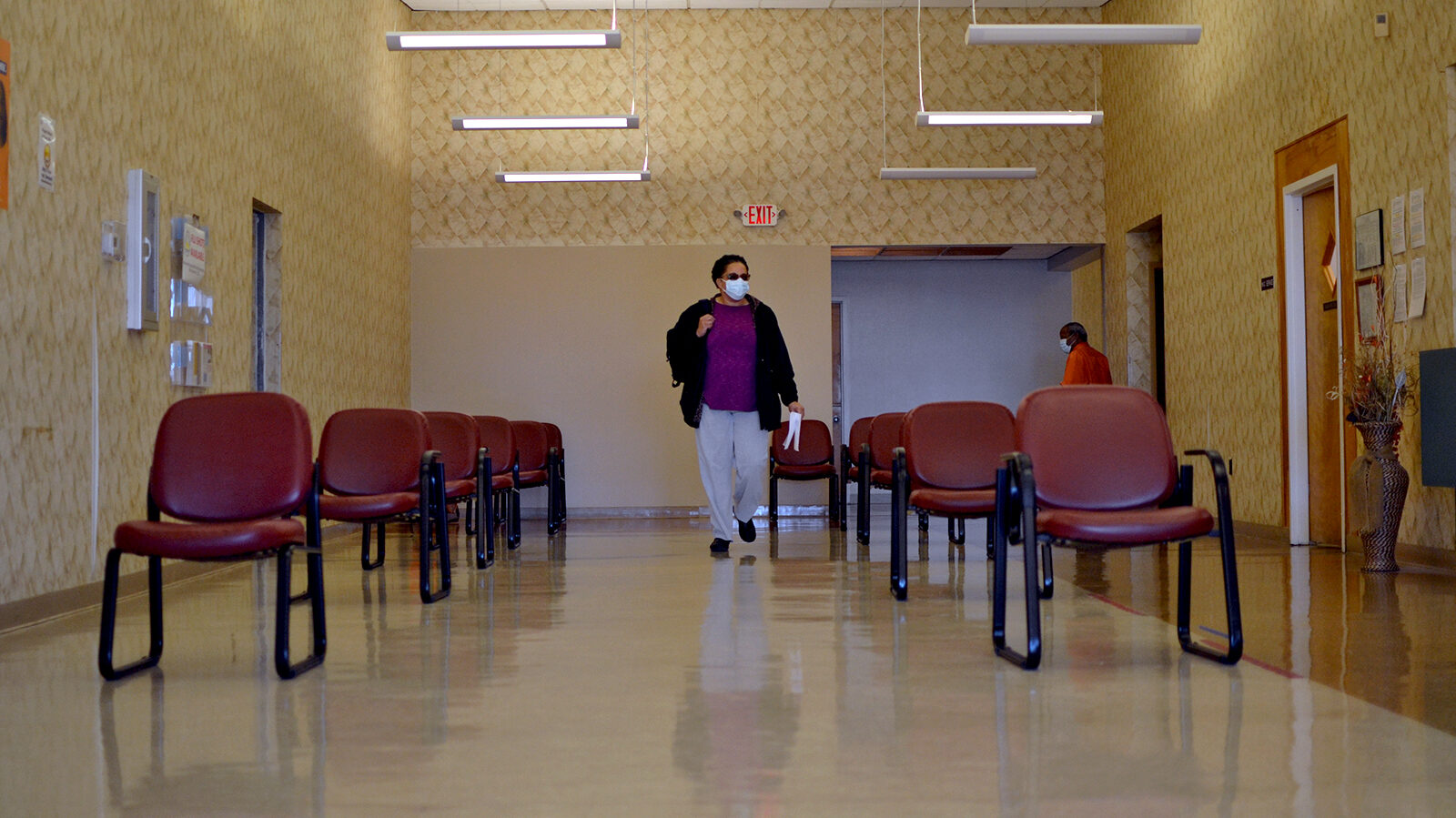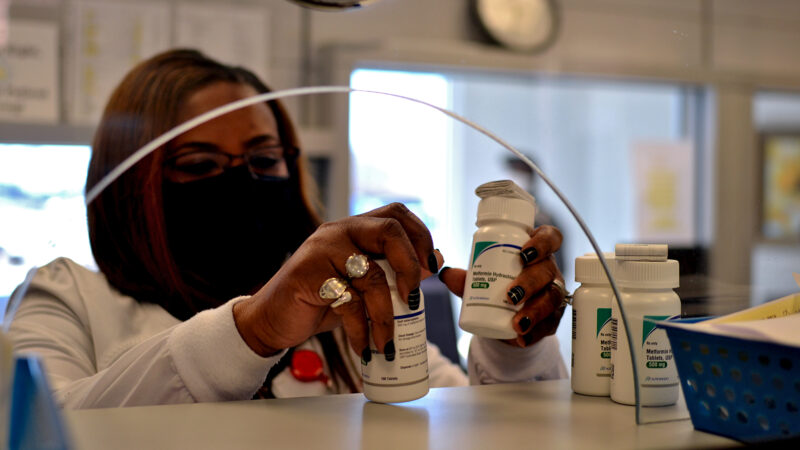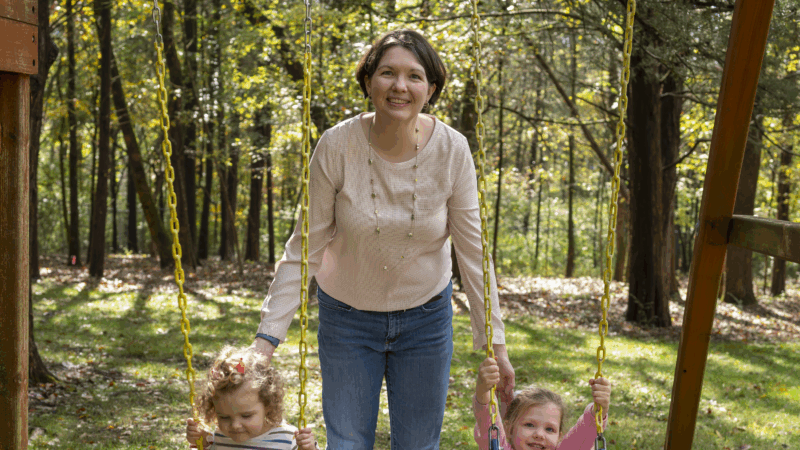Gulf South health care systems are failing to equally serve people of color, study says
A pharmacist at The Delta Health Center in Mound Bayou, Mississippi talks with a patient about medicine, June 3, 2021.
Health care systems across the United States are failing to equitably serve people of color. But, according to a new analysis, Mississippi, Louisiana, and Alabama are among the states with the worst health outcomes for people of color — Black and Latinx residents, in particular.
The report, which is a state-by-state scoreboard of racial and ethnic disparities in health care, comes from research and grant foundation Commonwealth Fund. Researchers considered indicators like health outcomes, health care access and quality of health care services to come up with a score for each state.
The report also looked at how health systems are serving five different racial and ethnic groups in a majority of states across the country: Black, White, American Indian/Alaska Native, Asian American and Native Hawaiian/Pacific Islander, and Hispanic/Latinx.
Researchers found that even in states that have better performing health systems, racial and ethnic disparities persist in terms of health outcomes and access.
Mississippi, Alabama and Louisiana, however, are seeing worse health outcomes and access in all residents than in other states, with Latinx and Black residents facing even more barriers within those states to quality health care. As a result, these states are also seeing larger gaps in health care outcomes and access across racial groups than most other states.
“The [health care] experience of Black individuals in those three states is worse than the experiences of Black people in other states. For example, worse than in New York, Washington, and Virginia,” said David Radley, a co-author of the report. “Even within the state of Louisiana, which is a [Medicaid] expansion state we still see big inequities in the health care experience of Black individuals and of Latinx individuals relative to the experience of white individuals.”
Researchers found that across the region, Black people and American Indian/Alaska Natives are more likely than white people in most other states to die early in life from conditions that would have been treatable if they had access to high-quality health care. Black women are also more likely than white women to be diagnosed with cancer at later stages and to die as a result of that.

Shalina Chatlani,Gulf States Newsroom
A woman walks through the dental clinic at The Delta Health Center in Mound Bayou, Mississippi, June 3, 2021.
While some of these inequities can be tied to factors like low income and political challenges, such as a failure to expand Medicaid, experts say that lack of social services and racial biases are also to blame.
“People of color are less likely to receive preventative health services irrespective of income, neighborhood, illness or insurance type, and often more likely to receive lower-quality care,” said Laurie Zephyrin, a co-author of the report.
The study authors say state leaders can help reduce inequities by encouraging affordable and comprehensive health insurance options to be available, strengthening primary care options, lowering administrative burdens for patients and investing in social services.
Editor’s note: The Commonwealth Fund supports health equity coverage, but the Gulf States Newsroom operates independently from it.
This story was produced by the Gulf States Newsroom, a collaboration between Mississippi Public Broadcasting, WBHM in Birmingham, Alabama, WWNO in New Orleans and NPR.
How IVF has led to a record number of single moms in their 40s
Who gets to be a parent has been reshaped by IVF: Single women in their 40s are increasingly opting to become moms.
Exercise is as effective as medication in treating depression, study finds
New research shows exercise is as effective as medication at reducing symptoms of depression. And you don't need to run a marathon to see benefits. So how much is enough?
Marrying for health insurance? The ACA cost crisis forces some drastic choices
While Congress debates bringing back Affordable Care Act subsidies , many Americans have already made life-altering decisions to afford health care.
Celebrities wear pins protesting ICE at the Golden Globes
Some celebrities donned anti-ICE pins at the Golden Globes on Sunday in tribute to Renee Good, who was shot and killed by an Immigration and Customs Enforcement officer last week in Minneapolis.
Malaysia, Indonesia become first to block Musk’s Grok over AI deepfakes
Malaysia and Indonesia have become the first countries to block Grok, the artificial intelligence chatbot developed by Elon Musk's xAI, after authorities said it was being misused to generate sexually explicit and non-consensual images.
Death toll from protests in Iran increases as Trump says Iran wants to talk
President Trump said Sunday that Iran proposed negotiations after his threat to strike the Islamic Republic over its crackdown targeting demonstrators. Activists say at least 544 have died.








